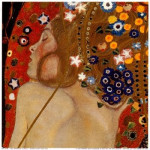

Image by William Blake
Genesis 3
The Fall
1 Now the serpent was more crafty than any of the wild animals the LORD God had made. He said to the woman, “Did God really say, ‘You must not eat from any tree in the garden’?”
And so be on your guard. Trickery and deceit comes subtly and cunningly. And in the guise of friendship and concern. It is wise to quietly interrogate proffered friendship and concern from those you hardly know. That is how “mentors” become tormentors.
* * *
And so temptation starts, “Did God really say?”
I have heard these words spoken to me, for instance when I am absolutely sure I have heard God’s voice advising a course of action. And God’s advice is often challenging, even senseless, to the rational mind. Because the jewel God requires of us is faith, he may often call us to do something which is senseless to the rational mind.
I have spoken these words myself, mainly when I want to be transgressive and not obey what seems to be the Godly course.
So be on your guard when you hear, “Did God really say?”
2 The woman said to the serpent, “We may eat fruit from the trees in the garden, 3 but God did say, ‘You must not eat fruit from the tree that is in the middle of the garden, and you must not touch it, or you will die.’”
4 “You will not certainly die,” the serpent said to the woman. 5 “For God knows that when you eat from it your eyes will be opened, and you will be like God, knowing good and evil.”
“You will not certainly die” the serpent says. The life of faith, the life of a Christian, is never easy. It requires a rigorous application of the mind, as well as the heart. So often voices sound certain, knowing, authoritative, as the serpent’s does, with our good at heart. I might have been deceived too. The safest source might be to stick to the truth revealed to you, when bedazzled by competing arguments.
* * *
And it’s human nature: prohibitions only serve to make forbidden fruit more desirable.
I am wondering if there is a parenting application here—the fewer the rules, the less trouble you have with your children. So rather than say no computer games, no sweets…point out the pleasures of reading, the pleasures of health. Parent by winning hearts and minds rather than by rules…which create the instant temptation to break them.
6 When the woman saw that the fruit of the tree was good for food and pleasing to the eye, and also desirable for gaining wisdom, she took some and ate it.
Tasty and attractive. The channels for the first temptation.
Pleasing to the eye, a masculine temptation; good for food, a feminine temptation??
She also gave some to her husband, who was with her, and he ate it.
Eve as the de facto leader of the family!! Eve sounds like a lot of women I know.
7 Then the eyes of both of them were opened, and they realized they were naked; so they sewed fig leaves together and made coverings for themselves.
With sin, comes shame. And the instinctive need to conceal shame.
8 Then the man and his wife heard the sound of the LORD God as he was walking in the garden in the cool of the day, and they hid from the LORD God among the trees of the garden.
And until one repents, that is the other effect of sin. One hides from the Lord. Skips one’s time of prayer. Prays about tangential things. Reads scripture instead of praying. Allows oneself to get distracted during times of prayer. If blogging is your spiritual discipline, then you blog about things far from where your heart really is.
These are all the instinctive reactions of one who continues in sin he will not repent of.
9 But the LORD God called to the man, “Where are you?”
One of the great questions, God asks man. “Where, exactly, are you?”
It is a good question to address in one’s quiet times. Where exactly am I?
10 He answered, “I heard you in the garden, and I was afraid because I was naked; so I hid.”
The heartbreaking effects of sin. One hides from one’s friend, because your friend would confront you with your sin, and require you to repent. One hides one’s true self from enemies, from the community. You lose some of the joy of friendship.
11 And he said, “Who told you that you were naked? Have you eaten from the tree that I commanded you not to eat from?”
The inextricable connection again between guilt and shame.
12 The man said, “The woman you put here with me—she gave me some fruit from the tree, and I ate it.”
The next consequence of sin—You blame someone else!!
13 Then the LORD God said to the woman, “What is this you have done?”
The woman said, “The serpent deceived me, and I ate.”
The next consequence of sin—You blame someone else!!
14 So the LORD God said to the serpent, “Because you have done this,
“Cursed are you above all livestock
and all wild animals!
You will crawl on your belly
and you will eat dust
all the days of your life.
15 And I will put enmity
between you and the woman,
and between your offspring[ and hers;
he will crush your head,
and you will strike his heel.”
and all wild animals!
You will crawl on your belly
and you will eat dust
all the days of your life.
15 And I will put enmity
between you and the woman,
and between your offspring[ and hers;
he will crush your head,
and you will strike his heel.”
Christ will win the victory but not without pain.
16 To the woman he said,
“I will make your pains in childbearing very severe;
with painful labour you will give birth to children.
Your desire will be for your husband,
And he will rule over you
with painful labour you will give birth to children.
Your desire will be for your husband,
And he will rule over you
The conflict between the sexes in a nutshell. The woman will desire, want (to own, control, possess, have?) her husband.
And he will rule over you. Oh dear! The Bible wasn’t written in 2011, was it? Though we still see the Genesis opinion of the roles of the sexes embedded in social mores. It is considered forward and shameful for a woman to propose marriage, for instance, in almost every culture, or to be too forward in bringing this happy state of affairs to pass. And in the vast majority of families, the man is still the principal financial provider, and the vast majority of families are financially reliant on the man’s work and skill.
“And he will rule over you.” Dear Lord, this is a most unpolitically correct statement. What were you thinking of? Please let me know. Love, Anita
Joking apart, C.S. Lewis in Mere Christianity tries to take on these rapidly-becoming-unfashionable
statements. He says that it is always best for men to set “the foreign policy” of families, because women tend to be emotional mother bears when it comes to protecting nest and nestlings, home and hearth. Hmm. There is something to that.
17 To Adam he said, “Because you listened to your wife and ate fruit from the tree about which I commanded you, ‘You must not eat from it,’
“Cursed is the ground because of you;
through painful toil you will eat food from it
all the days of your life.
through painful toil you will eat food from it
all the days of your life.
18 It will produce thorns and thistles for you,
and you will eat the plants of the field.
19 By the sweat of your brow
you will eat your food
until you return to the ground,
since from it you were taken;
for dust you are
and to dust you will return.”
and you will eat the plants of the field.
19 By the sweat of your brow
you will eat your food
until you return to the ground,
since from it you were taken;
for dust you are
and to dust you will return.”
God sets a link between work and food in place. And this link is essential for man’s emotional, psychological and, even perhaps, physical health.
This curse was partly lifted after the flood, when God sets a connection between seedtime and harvest in place, and was lifted to an even greater extent at Calvary.
20 Adam named his wife Eve, because she would become the mother of all the living.
21 The LORD God made garments of skin for Adam and his wife and clothed them. 22 And the LORD God said, “The man has now become like one of us, knowing good and evil. He must not be allowed to reach out his hand and take also from the tree of life and eat, and live forever.” 23 So the LORD God banished him from the Garden of Eden to work the ground from which he had been taken. 24 After he drove the man out, he placed on the east side[e] of the Garden of Eden cherubim and a flaming sword flashing back and forth to guard the way to the tree of life.
Exiled from Eden for a long season to a life of toil.
Genesis 4
Cain and Abel
1 Adam made love to his wife Eve, and she became pregnant and gave birth to Cain. She said, “With the help of the LORD I have brought forth a man.” 2Later she gave birth to his brother Abel.
Now Abel kept flocks, and Cain worked the soil.
I have often felt vegetarian may have been closer to God’s will. But given that the good Abel kept flocks, it’s probably okay to be a carnivore—as long as you eat compassionately raised, free-range meat (IMO). It’s costs more, but one’s conscience is at peace—and that’s worth a lot.
3 In the course of time Cain brought some of the fruits of the soil as an offering to the LORD. 4 And Abel also brought an offering—fat portions from some of the firstborn of his flock. The LORD looked with favor on Abel and his offering, 5 but on Cain and his offering he did not look with favor.
Why, why, why, did God not look on Cain and his offering with favour? Cain brought some of the fruits of the soil as an offering. There is no suggestion that this was a carefully thought out offering. However, when Abel gave an offering to God, he really gave it!! The first-born, the most precious of the flock in Jewish thinking, and the best and tastiest portions–the fat portions, (hey, those ancient Jews knew something!!).
So Cain was very angry, and his face was downcast.
The original sin of Cain. When we see God apparently look with more favour on someone else, our first reaction may be to be very angry, and have our faces downcast. However, the righteous reaction is to revise our lives, and to see if there is any sin in our lives, or anything, other than his sovereign will, which keeps his favour from us.
And to accept that we are actors in his play, and that he chooses our roles, and so it is rebellion to become very angry, and have our faces downcast.
6 Then the LORD said to Cain, “Why are you angry? Why is your face downcast? 7 If you do what is right, will you not be accepted?
Ancient words with modern relevance. Who has not been a bit angry, and had his face downcast when they have seen someone else apparently more blessed by God?
And God suggests a way that we too can experience the mysterious thing called his favour. If we do right, we too shall be accepted.
Acceptance by God. The best kind of acceptance. The only one which really counts. And God can make things happen.
“But if you do not do what is right, sin is crouching at your door; it desires to have you, but you must rule over it.”
When we are not doing the right thing, sin is ready to pounce on us, and control and master us. Instead, we must control our sinful impulses.
Does Cain accept God’s advice?
Do we?
8 Now Cain said to his brother Abel, “Let’s go out to the field.” While they were in the field, Cain attacked his brother Abel and killed him.
Jealousy can be deadly. So much of man’s endeavour, consciously or unconsciously, is to become one who is envied—for his wealth, success, spouse, kids, looks, lifestyle, whatever.
But jealousy can cause deadly harm.
Cain killed Abel for no reason other than that he was more blessed and favoured by God.
9 Then the LORD said to Cain, “Where is your brother Abel?”
“I don’t know,” he replied. “Am I my brother’s keeper?”
The deadly circle of sin begets sin. Jealousy and sulking beget murder, murder begets insolence and untruthfulness.
10 The LORD said, “What have you done? Listen! Your brother’s blood cries out to me from the ground. 11 Now you are under a curse and driven from the ground, which opened its mouth to receive your brother’s blood from your hand. 12 When you work the ground, it will no longer yield its crops for you
And when we are wronged—this is the best advice: Relax. There is a just judge. He hears innocent blood cry out. He puts those who wrong the innocent under the curse of his disfavour, the curse of restlessness among other things. And the curse of futility, of barren endeavour, working the ground which no longer yields crops for you.
“You will be a restless wanderer on the earth.”
The land in Jewish Old Testament thinking (God’s thinking?) was the good. Being driven from the land was one of the worst things which could happen to the ancient Israelites.
The punishment of Cain was “to be a restless wanderer on the earth.” Hmm, I have at last settled down 6 years ago in Oxford, and 5 years ago in our house. We love being rooted, and enjoy the blessing of that. An immense saving in time is one of the blessings of being rooted, having everything set up, and being able to work without the immense waste of energy that moves and being uprooted involves. Thank you, Lord, for roots.
13 Cain said to the LORD, “My punishment is more than I can bear. 14 Today you are driving me from the land, and I will be hidden from your presence; I will be a restless wanderer on the earth, and whoever finds me will kill me.”
15 But the LORD said to him, “Not so; anyone who kills Cain will suffer vengeance seven times over.” Then the LORD put a mark on Cain so that no one who found him would kill him. 16 So Cain went out from the LORD’s presence and lived in the land of Nod, east of Eden.
Mercy and justice always meet in God. Cain is punished, yes, but because he appealed, he is still under God’s protection, oddly enough to a greater extent that even Abel was. See Mark Buchanan’s take on this http://theoxfordchristian.blogspot.com/2010/06/life-is-unfair-and-thats-okay.html.
17 Cain made love to his wife, and she became pregnant and gave birth to Enoch. Cain was then building a city, and he named it after his son Enoch. 18 To Enoch was born Irad, and Irad was the father of Mehujael, and Mehujael was the father of Methushael, and Methushael was the father of Lamech.
19 Lamech married two women, one named Adah and the other Zillah. 20 Adah gave birth to Jabal; he was the father of those who live in tents and raise livestock.21 His brother’s name was Jubal; he was the father of all who play stringed instruments and pipes. 22 Zillah also had a son, Tubal-Cain, who forged all kinds of tools out of[g] bronze and iron. Tubal-Cain’s sister was Naamah.
23 Lamech said to his wives,
“Adah and Zillah, listen to me;
wives of Lamech, hear my words.
I have killed a man for wounding me,
a young man for injuring me.
24 If Cain is avenged seven times,
then Lamech seventy-seven times.”
wives of Lamech, hear my words.
I have killed a man for wounding me,
a young man for injuring me.
24 If Cain is avenged seven times,
then Lamech seventy-seven times.”
The horrid spirit of Cain, taking a magnified vengeance, 77 times over. Lord, preserve us from this forceful spirit.
25 Adam made love to his wife again, and she gave birth to a son and named him Seth,[h] saying, “God has granted me another child in place of Abel, since Cain killed him.” 26 Seth also had a son, and he named him Enosh.
At that time people began to call on[i] the name of the LORD.
The story of redemption continues, despite all detours.
Read my new memoir: Rosaries, Reading, Secrets: A Catholic Childhood in India (US) or UK.
Connect on Facebook: https://www.facebook.com/anitamathiaswriter/
Instagram: https://www.instagram.com/anita.mathias/
Twitter: https://twitter.com/AnitaMathias1
My book of essays: Wandering Between Two Worlds (US) or UK






